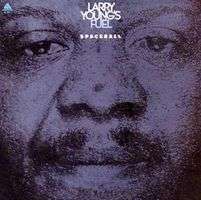Spaceball (album)
Spaceball is a jazz fusion album by organist/keyboardist Larry Young, released on the Arista Records label.
| Spaceball | ||||
|---|---|---|---|---|
 | ||||
| Studio album by Larry Young | ||||
| Released | 1976 | |||
| Recorded | 1976 | |||
| Genre | Jazz | |||
| Length | 41:45 | |||
| Label | Arista | |||
| Producer | Terry Philips and Brian MacDonald | |||
| Larry Young chronology | ||||
| ||||
| Review scores | |
|---|---|
| Source | Rating |
| Allmusic | |
| The Rolling Stone Jazz Record Guide | |
Reception
The Rolling Stone Jazz Record Guide said the album "is a triumph of musicianship over terrible ideas".[2]
Track listing
All tracks composed by Larry Young; except where indicated
- "Moonwalk" - 5:00
- "Startripper" (Terry Philips, Julius Brockington) - 4:44
- "Sticky Wicket" (Terry Philips, Julius Brockington) - 9:26
- "Flytime" (Terry Philips, Julius Brockington) - 4:50
- "Spaceball" - 5:07
- "Message from Mars" - 7:29
- "I'm Aware of You" - 5:09
Personnel
- Larry Coryell - vocals
- Larry Young - organ, keyboards
- Ray Gomez - guitar
- David Eubanks - bass
- Abdul Hakim - percussion
- Danny Toan - guitar
- Jim Allington - drums
- Al Lockett - flute, vocals, saxophone
- Paula West - vocals
- Barrett Young - percussion
- Farouk Abdoul Hakim - percussion
- Clifford Brown - percussion
gollark: In any case, I think it's a good *description* of part of human behavior, because people often really like motivated reasoning.
gollark: Well, John Searle's Chinese Room Experiment proved that no computer could understand Chinese, meaning they can't be sentient. Since humans are implemented in physics, like computers, we are also computers, and so not sentient. QED.
gollark: I assume they have a workaround for the finals and you can delegate someone else to get the plotter.
gollark: It's the part of the Copenhagen interpretation of ethics. If you aren't *sure* you're doing a bad thing, you aren't.
gollark: You can get adblocking on your phone, as you should do.
References
- Allmusic listing
- Swenson, J., ed. (1985). The Rolling Stone Jazz Record Guide. USA: Random House/Rolling Stone. pp. 211. ISBN 0-394-72643-X.
This article is issued from Wikipedia. The text is licensed under Creative Commons - Attribution - Sharealike. Additional terms may apply for the media files.